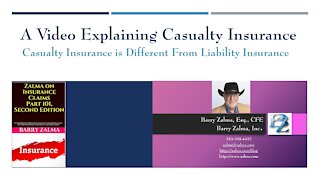Premium Only Content

A Video Explaining When the Notice-Prejudice Rule Does Not Apply
The Notice-Prejudice Rule Doesn't Always Apply
Claims made and claims made and reported policies contain a date certain notice requirement. In Colorado, the Colorado Supreme Court found:
"The notice-prejudice rule does not apply to a date-certain notice requirement in a claims-made insurance policy. In a claims-made policy, the date-certain notice requirement defines the scope of coverage. Thus, to excuse late notice in violation of such a requirement would rewrite a fundamental term of the insurance contract." (Craft v. Philadelphia Indemnity Insurance Company, 2015 CO 11, 343 P.3d 951)
The conceptual differences between occurrence and claims-made liability policies lie at the core of this case. The Colorado Division of Insurance defines an occurrence policy as ‘an insurance policy that provides liability coverage only for injury or damage that occurs during the policy term, regardless of when the claim is actually made.’ (3 Colo. Code Regs. 702–5:5–1–8 (2014).)
Claims-made policies typically contain a second type of notice requirement not found in occurrence policies: the requirement that the insured provide notice of a claim within the policy period or a defined reporting period thereafter. Such a date-certain notice requirement fulfills a very different function than a prompt notice requirement.
Where a prompt notice requirement serves to allow the insurer to investigate the claim and negotiate with the third party asserting the claim, the date-certain notice requirement defines the temporal boundaries of the policy's basic coverage terms.
-
 10:17
10:17
Barry Zalma, Inc. on Insurance Law
1 year agoWho's on First - Defense and/or Indemnity
197 -
 16:42
16:42
Barry Zalma, Inc. on Insurance Law
5 years agoA Video Explaining Casualty Insurance
79 -
 16:33
16:33
Barry Zalma, Inc. on Insurance Law
5 years agoA Video Explaining the Unethical Insured
17 -
 16:52
16:52
Barry Zalma, Inc. on Insurance Law
5 years agoA Video Explaining how to Apply Ethics to the Work of the Insurance Professional
20 -
 16:17
16:17
Barry Zalma, Inc. on Insurance Law
5 years agoA Video Explaining the Concurrent Cause Doctrine
53 -
 15:24
15:24
Barry Zalma, Inc. on Insurance Law
5 years agoA Video Explaining the Claims Made CGL
63 -
 17:29
17:29
Barry Zalma, Inc. on Insurance Law
5 years agoA Video Explaining the Nature of Insurance Underwriting
37 -
 15:19
15:19
Barry Zalma, Inc. on Insurance Law
5 years agoA Video Explaining the Need for Construction Experts
54 -
 13:28
13:28
Barry Zalma, Inc. on Insurance Law
5 years agoA Video Explaining How a Claims Person Should Select Counsel
18 -
 17:16
17:16
Barry Zalma, Inc. on Insurance Law
5 years agoA Video Explaining the Evidence Needed to Prove Fraud
412